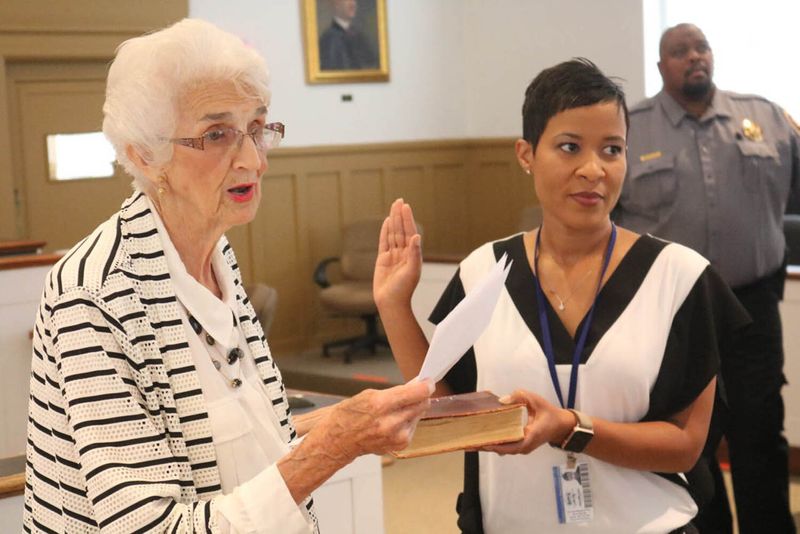
Series: The Untouchables
Investigating South Carolina’s Judges
This article was produced for ProPublica’s Local Reporting Network in partnership with The Post and Courier. Sign up for Dispatches to get stories like this one as soon as they are published.
A South Carolina magistrate has been removed as her county’s chief judge following a string of allegations that she abused her position and breached her duty to remain impartial toward the local sheriff’s department, which until recently was run by her husband.
State Supreme Court Chief Justice Donald Beatty ousted Angel Underwood as Chester County’s chief magistrate on July 1.
Beatty, through a spokesperson, declined to answer questions for this article, so it’s not clear if his decision had anything to do with the allegations raised against Underwood.
The Post and Courier and ProPublica first reported in 2019 on a confidential ethics complaint about Underwood’s conflicts of interest. Records showed the judge had helped forward crime tips to sheriff’s deputies working for her husband. She also secretly helped a top deputy draft a complaint alleging that two fellow judges were unfairly blocking the sheriff’s requests for criminal warrants, the news organizations reported.
South Carolina court officials have yet to take action in the case, two years after it was filed.
Now, Underwood faces fresh allegations from Chester County’s new sheriff, who defeated Underwood’s husband in the 2020 election. When Chester voters went to the polls in November, Alex Underwood was facing federal corruption charges; he was found guilty this April.
In a grievance filed with court officials in March, obtained by The Post and Courier and ProPublica, new sheriff Max Dorsey said Angel Underwood likely harbored biases against him and his office, including against several deputies who went on to testify about her husband’s behavior in the April trial.
In an interview with a reporter, the sheriff said magistrates under Angel Underwood’s supervision had rejected what Dorsey considered to be legitimate requests for warrants.
In one case, a magistrate under Angel Underwood’s supervision denied an arrest warrant for a man who had published several Facebook posts calling for Chester police and sheriff’s deputies to be killed, records show. The sheriff contended the posts violated a state law that prohibits threats to public officials.
In another, a magistrate rejected a warrant request for a man who had allegedly trespassed on a couple’s property, exposed himself to the wife and then peed on her husband’s truck.
“I can’t think of another reason why they would be rejected” other than Angel Underwood’s influence, Dorsey told the newspaper.
At the time of those requests, as chief magistrate in Chester County, Angel Underwood was in charge of her fellow judges, though she held no formal authority to discipline or sanction them.
Twice a year, Beatty selects chief judges in every county to serve six-month terms. He reappointed Angel Underwood as Chester County’s chief twice while her 2019 ethics complaint was pending, telling The Post and Courier that the county had several new magistrates who were less experienced. Most recently, as part of his statewide selections, Beatty replaced Angel Underwood as chief with Judge Jeffrey Garis, a magistrate since 2019.
Officials with the South Carolina Office of Disciplinary Counsel, tasked with policing judges and lawyers, declined to discuss Angel Underwood’s case.
Angel Underwood, through her lawyer, also declined to answer questions and asked a reporter not to contact her again. Asked about Dorsey’s allegations against the judge, attorney I.S. Leevy Johnson said, “Our detailed response to the meritless complaint will be contained in our response that we will submit to the Office of Disciplinary Counsel in a timely manner.” Though Dorsey’s complaint was filed March 15, records show disciplinary officials didn’t open a case until June 1, about three weeks after The Post and Courier began asking questions about the issue.
In the joint 2019 investigation, The Post and Courier and ProPublica revealed how South Carolina’s cloaked system of oversight for its state judges resulted in leniency and allowed allegations to remain buried — sometimes for years.
Bound by confidentiality protections that far exceed what South Carolina offers to other officials, the disciplinary office shields its work from the public. And unlike almost every other state, South Carolina has gone decades without publicly sanctioning any of the state’s powerful circuit judges, despite more than 1,000 complaints against them over two decades, the news organizations found.
Angel Underwood’s case also shows how judges in South Carolina’s lower courts escape public scrutiny. Magistrates, the state’s busiest judges, handle hundreds of thousands of low-level criminal and civil cases each year.
They do not have to be attorneys, a profession steeped in legal and ethical training. About three-quarters of the state’s magistrates, including Angel Underwood, lack a law license, the news organizations found.
Some South Carolina lawmakers have called for stricter prerequisites for holding those posts and more layers of scrutiny in the magistrate appointment process.
South Carolina, unlike any other state, allows state senators to handpick judges for their districts without any input from outside lawmakers. That means to keep her post, Angel Underwood has only needed the support of the lone senator in Chester County: state Sen. Mike Fanning.
Fanning, a Democrat, is a close ally of the Underwoods who has endorsed their runs for public office and regularly posts photos with the pair. In a recent interview with The Post and Courier, he defended Angel Underwood and insisted the judge has done nothing improper. He called her outstanding.
State Sen. Tom Davis, who has introduced legislation calling for reforms, said it’s critical for the state to have a speedier system of accountability when magistrates have their conduct called into question.
The “lack of responsiveness” from the Office of Disciplinary Counsel “or the tolerance for these things is indicative that still the magistrate system is looked at as being an outlier,” said Davis, a Republican. “That’s something that has to change.”
Davis filed his Magistrate Reform Act in December 2019, after reading the report by The Post and Courier and ProPublica. The bill has stalled in the state Senate. It has not even received a hearing.
Magistrates sit in judgment on cases involving petty thefts, drunken driving, domestic violence, assaults and disorderly conduct.
They can also sign off on criminal warrants, set bail and conduct preliminary hearings to assess if there is sufficient probable cause to support felony charges such as rape, robbery and murder.
Angel Underwood’s ability to carry out her duties impartially was first called into question in 2015. That was when the state Supreme Court suspended her for a year after disciplinary investigators discovered she had failed to disqualify herself from more than 100 cases brought by her husband’s department.
Then, in the matter first reported by The Post and Courier and ProPublica, the judge faced a second complaint from one of her colleagues, former Chester County Magistrate Barbara Cameron.
Cameron alleged that Angel Underwood remained “constantly involved” in the operations of the sheriff’s department while her husband ran it. The judge huddled behind closed doors with top deputies and helped forward crime tips for deputies to follow up on, Cameron wrote in the complaint.
Angel Underwood even presided over a drunken-driving case brought by her husband’s office, then forged Cameron’s name on a court document to cover it up, Cameron alleged.
“The appearance of impartiality and fairness between the departments was laughable,” Cameron wrote in the complaint, which state disciplinary officials have yet to resolve.
Cameron declined to discuss details of her complaint with The Post and Courier. The newspaper asked how she felt about the delay in it being resolved. Through her lawyer, she gave a one-word answer: “Disgusted.”
In 2019, The Post and Courier reported that Angel Underwood had flown first class on the public’s dime to a conference in Reno, Nevada. The trip was arranged by her husband, the sheriff at the time. Federal prosecutors eventually secured indictments against Alex Underwood, alleging he abused his power and skimmed public money to finance the trips.
Alex Underwood was convicted in April in federal court of seven corruption and abuse charges. He awaits sentencing but in the meantime has requested a new trial, arguing prosecutors didn’t produce sufficient evidence of his guilt. Angel Underwood was not charged in the case, though her name came up repeatedly in her husband’s trial. Alex Underwood and his defense team insisted his handling of public money was nothing more than a minor oversight.
Dorsey, the new sheriff, insisted in his March complaint that Angel Underwood’s handling of any sheriff’s department matters has “great potential to be unfair.”
Fanning, the senator who appointed Angel Underwood, dismissed the complaint as meritless, insisting she “has not ruled in any case in a way that was inappropriate with the new sheriff.”





